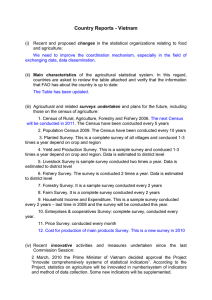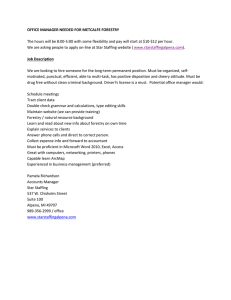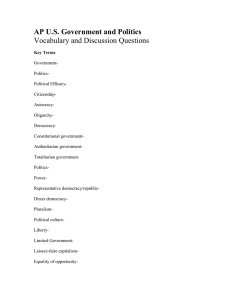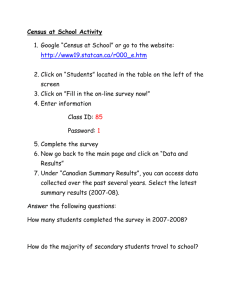Regional Workshop on integrating agricultural questions with 2020 round of
advertisement
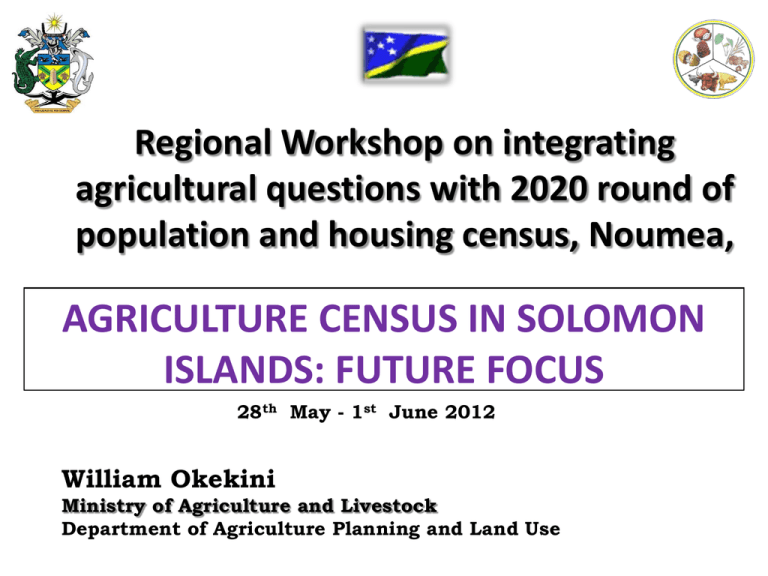
Regional Workshop on integrating agricultural questions with 2020 round of population and housing census, Noumea, AGRICULTURE CENSUS IN SOLOMON ISLANDS: FUTURE FOCUS 28th May - 1st June 2012 William Okekini Ministry of Agriculture and Livestock Department of Agriculture Planning and Land Use Basic Facts • Agriculture is the ‘backbone’ of Solomon Islands’ economy and rural livelihood. • 992 Islands, total land size of 27,547km2 and 0.62 per cent of the total land are arable and suitable for agriculture production. • 87 % of the total land is under Traditional Land Tenure System • 2009 Household Population census - 515,870, Males – 264,455, Females – 251,415, House Holds – 91,251 • GDP per capita: 2,800 US dollars • Agriculture contribution to total GDP ranges from 35 – 42 % per annum • Major earnings coming from exported agriculture commodities such as Cocoa Beans, Coconuts (Copra & Oil) and Palm Oil. • Stress from TLTS has put pressure on food production, commodity export prospects and food security. • Labor force by occupation in agriculture is 75% • Agricultural commodity exports are still the major source of earnings to the country. Map of Solomon Islands Agriculture Data • • • • • • S.I is yet to conduct an Agriculture Census HH Population census (Every 10 yrs) HIES (5 yrs) Agriculture Rural Development Study Cash crop data – Cocoa, coconut, palm oil Agricultural and Forestry-themed National Minimum Development Indicators Weakness • Consistency and cross-sectional • Measurements and usage of data • Weak partnership linkage between Ministries and other stakeholders 2009 Population Census Questionnaire 2009 PCQ Cont… 2009 PCQ Cont… Coverage for Solomon Islands - Agricultural and Forestry-themed National Minimum Development Indicators Score (Yes=1, Proxy = 0.5, Theme Code Indicator Data is available? No = 0) Before country After country visit (internet After country visit Before visit (Apr search only) (April 2012) country visit 2012) AF.1.1 Proportion of household income from agriculture and forestry activities (%) No AF.1.2 Proportion of national GDP from agriculture and forestry (%) No Yes (2005-6) 0 1 Yes (2005-6) Proxy (1999) 0 1 Proxy (1999) 0.5 0.5 AF.1.4 Proportion of national budget allocation for agriculture and forestry (%) No Yes (2011) 0 1 AF.2.1 Value of domestic production of agriculture and forestry products (US$ per year) No No 0 0 AF.2.2 Volume of total domestic production agriculture and forestry products (kg) No No AF.2.3 Volume of exports of agriculture and forestry products (kg per year) AF.2.4 Value of exports of agriculture and forestry products (US$ equivalent per year) No No Yes (1st part of 2012) 0 0 0 1 Yes (1st part of 2012) 0 1 Yes (1st part of 2012) 0 1 Yes (1st part of 2012) 0 1 Macroeconom AF.1.3 Proportion of labour force engaged in agriculture and forestry activities as their ic/ overview primary activity (%) Trade and food dependency AF.2.5 Volume of imports of agriculture and forestry products (kg per year) No AF.2.6 Value of imports of agriculture and forestry products (US$ equivalent per year) No AF.2.7 Food price index Yes (2008) Yes (2012) 1 1 AF.2.8 Food import dependency ratio % No Yes (2005-6) 0 1 AF.3.1 All available agricultural land use classifications as proportion of total land area No No 0 0 Yes (2010) Yes (2005-10) 1 1 1 1 Yes 0 1 No 0 0 Proxy 0 0.5 Total covered 3.5 13 (%) AF.3.2 Area of forested land as proportion of total land area (%) (MDG 7.1) Land Resources AF.3.3 Current rate of deforestation - forests cleared (Hectares/year and percentage of Yes (2010) Yes (2005-10) forests per year = [hectares/year]/total hectares) AF.3.4 Area of reserved/protected land as proportion of total land areas (%) No AF.3.5 Average annual soil erosion rate – wind and water erosion (thousand tonnes per No hectare) Nutrition AF.4.1 Daily consumption of fruit and vegetables per capita per day (Mean number of servings per day) Source: Bower, J. 2012 No 18 Total no. indicators Percent coverage 19.4% 72.2% Uses of the S.I Agriculture Census Data • • • • • • • • Input – output relationship (Productivity) Production Vs Land use Population Vs Production Production Vs Soil fertility Production Vs Farming systems Trend Analysis Food production Vs utilization Designing Gov’t Policies, planning and decision making Connecting Agric Census to SIIARD • • • • • • Solomon Islands Information for Agriculture and Rural Development (SIIARD) will result in evidence-based policy, strategic planning, decision-making and implementation of agriculture and rural development programs with regard to: Agricultural land use systems Areas of agricultural opportunity Areas of rural disadvantage Areas of climate-change induced food security vulnerability and adaptability Areas of Food Security and Nutrition, and Areas of and for economic growth and development SIIARD Framework SIIARD Framework Frame work SIIARD SIRIS SISEM SIMAS AGRICULTURE CENSUS LAND USE P3D MODELLING Way forward • • • • • Funding Agric. Census in S.I to be done before 2014 Stand alone Project Questionnaire design The use of data in policy, planning and decision making • Training – capacity building Thank You for Listening
